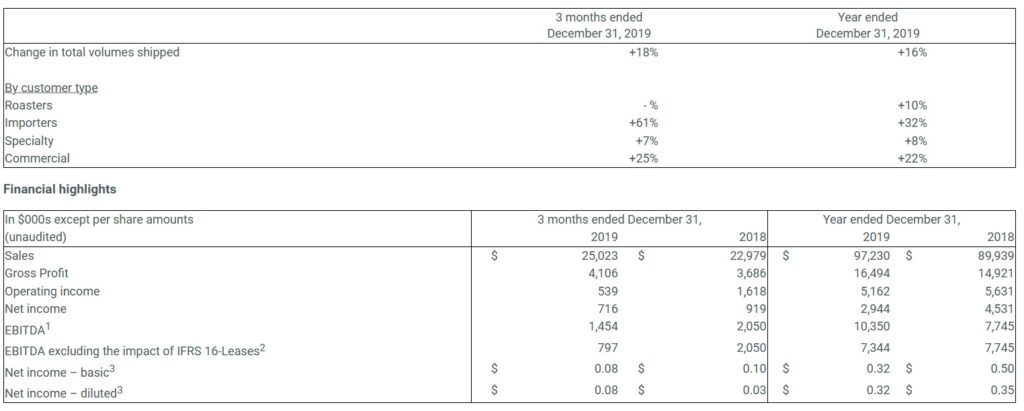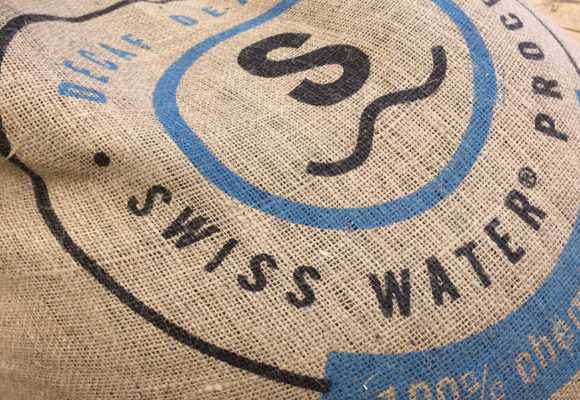VANCOUVER, British Columbia, Canada – Swiss Water Decaffeinated Coffee Inc. (TSX – SWP) (“Swiss Water” or “the company”) has reported strong financial results for the fourth quarter and year ended December 31, 2019. With annual processing volumes up by 16%, and gross profit up 11% year-over-year, the company’s strong growth trajectory continued unabated in 2019. Swiss Water is a premium green coffee decaffeinator that employs the proprietary Swiss Water Process to decaffeinate green coffee without the use of chemicals.
Through 2019, the company continued to increase its market share and win new business, as more and more industry participants, and coffee consumers move away from chemical decaffeination in favor of chemical free processes. At the same time, growing demand from existing customers is fueling robust organic growth. Anticipating the need to add more production capacity sooner than previously expected, Swiss Water’s Board of Directors has suspended dividend payments in order to help fund the construction of a second production line in Delta, BC.
“We are pleased to report that the strong growth in volumes we have achieved for the past three years continued through the fourth quarter enabling us to deliver record growth for 2019”, said Frank Dennis, Swiss Water’s President and CEO.
“Despite the immediate challenges presented by the COVID-19 pandemic, we are confident that demand for our proprietary SWISS WATER® Process decaffeinated coffees will continue to grow at double-digit rates well into the future adding to the longer-term pressure on our production infrastructure. The build-out of our new state-of-the-art production facility in Delta, BC is nearly completed and commissioning of the new production line is underway, and going according to plan. We should be in a position to begin shipping commercially from the new plant in the second quarter of this year.”
“In other developments, the sale of our legacy production site in Burnaby, BC to a new owner on February 14th of this year, means that expansion of our new Delta facility is likely to become necessary sooner than we had previously anticipated. While our lease on the Burnaby property, which expires in June 2023, provides for an additional five-year extension (to 2028), this is at the sole discretion of the landlord. Under the terms of the lease, the owner has until June 2021 to inform us of their intentions – just two years before we have to vacate should an extension not be granted. In assessing the impact of this change of ownership, we have concluded that the potential risk it poses to our ability to continue operations at the Burnaby site beyond 2023 is unacceptable.
Accordingly, in order to provide the capacity we will need to meet future demand for our coffees, we are moving forward immediately with preparations to build a second production line in Delta with the goal of completing it before the lease in Burnaby expires. This development has prompted our Board of Directors to make the decision to suspend dividend payments to our shareholders. We believe that, by redeploying the funds we have previously paid out in dividends to help us build a second line in Delta, BC, we will be able to create superior value over the longer term,” said Dennis.
“As to the COVID-19 outbreak, we are closely monitoring its potential impact on our operations and implementing the appropriate risk management procedures. The situation is dynamic and changing day-to-day. So far, the operational impact has been restricted to inflationary pressure on outbound freight rates to Asia. This is being driven by a fall in shipping traffic across the Pacific Ocean and a resulting reduction in container availability for our exports to this region. Looking forward, we may well experience disruptions to business operations and possibly delays in the commissioning of our Delta facility. For example, if a significant number of our employees or commissioning contractors, or employees of our customers or suppliers, are quarantined and unable to work there may be significant disruptions and delays in our ongoing business or in the start-up procedures at Delta. We will continue to closely monitor the situation and work to mitigate its effects,” Dennis added. Below is a summary of Swiss Water’s operational and financial results.
Swiss Water – Operational highlights
The following table shows year-over-year changes in volumes shipped during the fourth quarter and year ended December 31, 2019.
 1 EBITDA is defined in the ‘Non-IFRS Measures’ section of the MD&A and is a “Non-GAAP Financial Measure” as defined by CSA Staff Notice 52-306.
1 EBITDA is defined in the ‘Non-IFRS Measures’ section of the MD&A and is a “Non-GAAP Financial Measure” as defined by CSA Staff Notice 52-306.
2 EBITDA excluding the impact of IFRS 16 – Leases is defined as EBITDA, less lease payments made during the year.
3 Per-share calculations are based on the weighted average number of shares outstanding during the periods.
- Fourth quarter revenue increased by 9% to $25 million, and revenue for the year improved by 8% to $97.2 million, compared to the same periods in 2018. The increases were due to growth in processing volumes, accompanied by a higher average US dollar (“US$”) exchange rate, as well as increases in green coffee sales volumes, offset by a lower coffee futures price (“NY’C’”).
- Gross profit for Q4 was $4.1 million. This represents a $0.4 million increase compared to the fourth quarter of 2018. The company’s 2019 Q4 gross profit was positively impacted by increased overall process volumes and a higher proportion of regular volumes in its sales mix, as well as improved supply chain efficiencies, and ongoing efforts to control operating costs. These enhancements were partially diluted by the impact of higher labour costs.
- Full-year 2019 gross profit increased to $16.5 million from $14.9 million in 2018. The improvement in gross profit was achieved despite the need to absorb much higher than expected energy costs. This was due to a temporary spike in the price for natural gas resulting from a pipeline explosion in October 2018 that significantly reduced the supply of gas in British Columbia during Q1 2019. Swiss Water continues to actively pursue margin maintenance and improvement measures across its operations following a period during which it had to absorb a number of inflationary cost increases. The company is also seeking variable and fixed cost reduction opportunities while vigorously maintaining product quality.
- Operating expenses increased by 73% to $3.6 million in the fourth quarter, and grew by 22% to $11.3 million for the full year when compared to the same periods in 2018. It’s noteworthy that In Q4 2018, Swiss Water received a one-time payment in relation to the Canadian Scientific Research and Experimental Development (SRED) programme. The absence of a similar benefit in Q4 2019 was a material driver of operating expense inflation compared to Q4 2018. In addition, higher occupancy expenses were recorded in Q4 2019 as the company began to utilize the office space in its new production facility in Delta, British Columbia. On an annualized basis inflationary pressure on operating expenses was driven by a series of one-off expenses. These included: a restructure of the company’s sales and marketing function; increased investment in capacity enhancement, and research and development projects. Higher professional fees; and moving costs in relation to the consolidation of warehousing activities by its Seaforth Supply Chain Solutions subsidiary also contributed to the increase.
- Operating income decreased by $1.1 million, or 67%, to $0.5 million in the fourth quarter and was down by $0.5 million, or 8%, to $5.1 million for the year, when compared to the same periods in 2018.
- Fourth quarter net income was $0.7 million compared to $0.9 million in Q4 2018. Full-year net income was $2.9 million, compared to $4.5 million in 2018. The improved gross profit achieved in 2019 was offset by increases in both operating and non-operating expenses. The increased non-operating expenses were driven by a loss on risk management activities and the revaluation of an embedded derivative. In addition, higher finance expenses were booked following the adoption of IFRS 16 – Leases.
- EBITDA decreased by $0.6 million, or 29%, to $1.5 million in the fourth quarter and increased by $2.6 million, or 34%, to $10.4 million for the full year, when compared to the same periods in 2018. The increase in EBITDA was largely due to the adoption of new accounting standards related to leases, IFRS 16 – Leases. Compared to 2018, EBITDA, excluding the impact of IFRS 16, decreased by $1.3 million, or 61%, to $0.8 million in Q4, and decreased by $0.4 million, or 5%, to $7.3 million for the full year. Operationally, the change in EBITDA was driven by strong growth in processing volumes, ongoing efforts across the company to enhance cost recovery and an increased financial contribution from Seaforth. These gains were offset by a series of one-time expenses. These were specifically related to relocation activities, a temporary increase in natural gas costs, investment in sales team initiatives, increased research and development activity and a lower refund from a research and development incentive programme.
- During Q4 2019 the Company entered into an asset-based credit facility with a Canadian bank. The available balance of the credit facility is based on the lower of the Borrowing Base margins of eligible assets, and $30.0 million. This credit facility replaced two former credit facilities and can be drawn on to fund operational and capital initiatives.
- Construction of Swiss Water’s new decaffeination facility, located in Delta, BC, is nearing completion. The initial new production line is currently undergoing commissioning and commercial shipments of decaffeinated coffee from the new plant are expected to begin in Q2 2020.
Quarterly Dividends
Subsequent to the end of the fourth quarter, on January 15, 2020, the company paid an eligible dividend in the amount of $0.6 million ($0.0625 per share) to shareholders of record on December 31, 2020.
Subsequent events
On February 14, 2020, the ownership of the company’s leased facility in Burnaby, BC changed. The terms of the lease agreement on this property remain unchanged.
On February 24, 2020, a total of 17,570 of the outstanding RSUs vested and were converted to common shares, pursuant to the 2011 Restricted Share Unit Plan as amended on June 18, 2019.
On March 18, 2020, Swiss Water’s Board of Directors decided to suspend future dividends in preparation to build a second production line in Delta, BC.
In March 2020, the World Health Organization declared a global pandemic known as COVID-19*. The impacts on global commerce are expected to be far reaching. For Swiss Water, the pandemic may impact demand for the Company’s products and services in the near term and may disrupt its supply chains. It may also impact expected credit losses on amounts due from customers and whether Swiss Water continues to meet the criteria for hedge accounting. For example, if a hedged forecast transaction is no longer highly probable to occur, hedge accounting is discontinued.
*Under IAS 10, Events after the reporting period, events such as this are considered to be non-adjusting subsequent events. The impacts to the Company are not determinable at the date of these financial statements, however, they could be material and include impairments of receivables, inventory and liquidity.


















